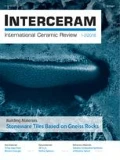There is one issue dominating the ceramics industry right now: sustainability. In the current situation, the sustainable use of available resources is more important than ever. On the other hand, energy availability and rising energy prices bring new challenges. The refractories industry is in the middle of these substantial changes, as it supplies energy-intensive industries such as steel manufacturers, cement plants, the chemical industry or waste incineration plants with the crucial materials. These now have to be adapted to new circumstances such as alternative fuels. The program of this year's Freiberg Refractory Materials Symposium examined the issue from various angles and provided suggestions for minimizing the carbon footprint. At the International Colloquium on Refractories 2022 in Aachen, keynotes will also revolve around the future of the refractories industry and its transformation towards CO2 neutrality, as well as changes in energy supply and their significance for the steel industry.
The EU Ceramic Roadmap to Climate Neutrality by 2050, published by Cerame-Unie, shows that the ceramics industry has already been able to significantly reduce CO2 emissions through measures such as process optimization, more efficient production and fuel substitution. According to the study, which has been updated since 2013, total emissions from the ceramics industry in the EU have already fallen by 45 % since the year 2000. In order to achieve the goal of climate neutrality, efforts include a switch to renewable energies and the establishment of strategies for CO2 capture and use.
There are also exciting new research projects in the field of concrete production. Cement has so far been known as a not very eco-friendly building material. New approaches now use magnesium carbonates as a binder instead of limestone, which releases high amounts of CO2 during firing. During processing, more CO2 is bound than emitted, which means that concrete can even be used as a carbon sink.

Leyla Buchholz
Editor-in-Chief
leyla.buchholz@springernature.com
Rights and permissions
About this article
Cite this article
Topic Number One. Interceram. - Int. Ceram. Rev. 71, 3 (2022). https://doi.org/10.1007/s42411-022-0511-2
Published:
Issue Date:
DOI: https://doi.org/10.1007/s42411-022-0511-2

